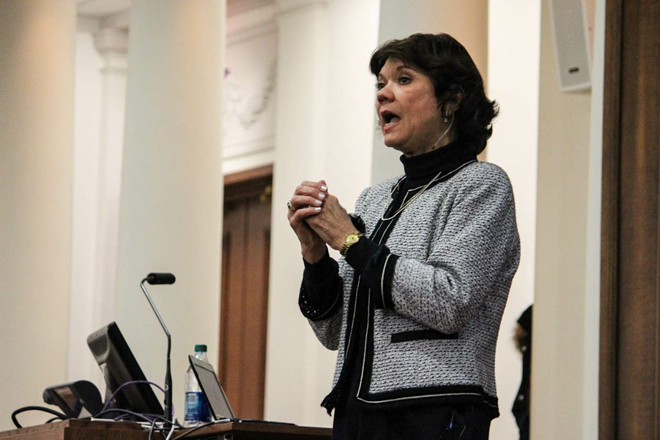
When Dr. Donna Nelson became a science advisor for Breaking Bad, one of the first things she had to do was clarify the chemical quantities needed for synthesizing meth. For the University of Oklahoma chemistry professor, this task was like any other, except in this case the producers asked her to think in terms of gallons, not grams.
On Friday night, Nelson spoke in a crowded Harris Hall about the importance of scientific accuracy in films and television, namely in terms of her experience getting the facts right for Breaking Bad.
“Science in the show is bigger than life and often outshines the actors,” Nelson said. “The science is often so strong that it seems to be a separate character.”
Nelson became a science advisor for the award-winning AMC television drama in mid-2008, shortly after the show had begun to air. From the beginning, executive producer Vince Gilligan was keen on getting the science right, Nelson said. She reached out to Gilligan about helping as an advisor, and soon after she visited him in Burbank and became one of the show’s chemistry experts.
“I was trying to do something good for society,” Nelson said.
Her interest in collaboration between scientists and the entertainment industry is founded in a few key benefits. Not only does collaboration improve the accuracy of science in entertainment, but it also paves the way for a more positive portrayal of scientists, which may in turn affect the science world itself. “Portraying scientists and science correctly in popular culture helps recruit young men and women into the field,” she said.
Nelson said that since she took her role as an advisor for Breaking Bad, the show has been scientifically accurate, albeit using simplified scientific concepts. For example, in order to make compounds easier for the actors to recite, Nelson has suggested alternate yet accurate forms of chemicals. Sometimes she only has to change a couple of words in a scene, but in others she has had to essentially rewrite a page of the script. Besides the blue meth, Walter White’s signature product, inaccurate concepts have never been used as plot devices.
While Nelson has a role in making sure each episode contains legitimate scientific concepts, that does not mean everything is complete. “We hesitate to show the steps of synthesizing meth,” Nelson said. “What you see on the show is indeed accurate, but we leave out critical details and combine several methods. If you were to follow Breaking Bad as a recipe, you’d end up with garbage.”
With Breaking Bad set to enter its final season, Nelson hopes to continue her work of bridging the gap between science and entertainment. She says she is willing to take other opportunities for science advising once the show ends, but she is also working to advise the state of Oklahoma on a drug-related legislation.
Throughout the life of the show, Nelson’s expertise has given her considerable influence, but even she doesn’t know how it’s going to end. “I keep trying to visit the set, but Vince [Gilligan] won’t even allow me to stop by,” she said to a laughing audience. “But even if I did know the ending, I wouldn’t share it at all.”